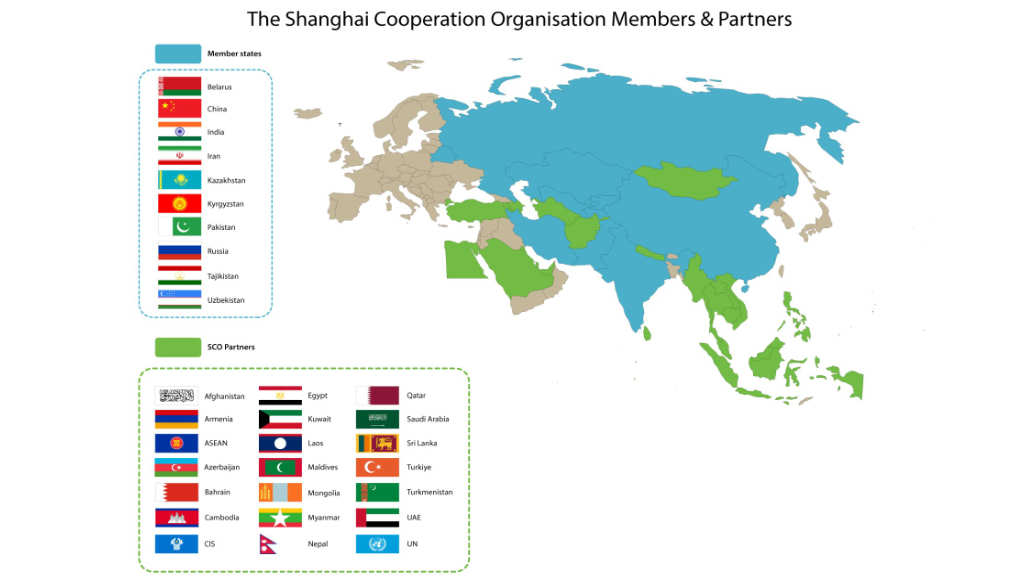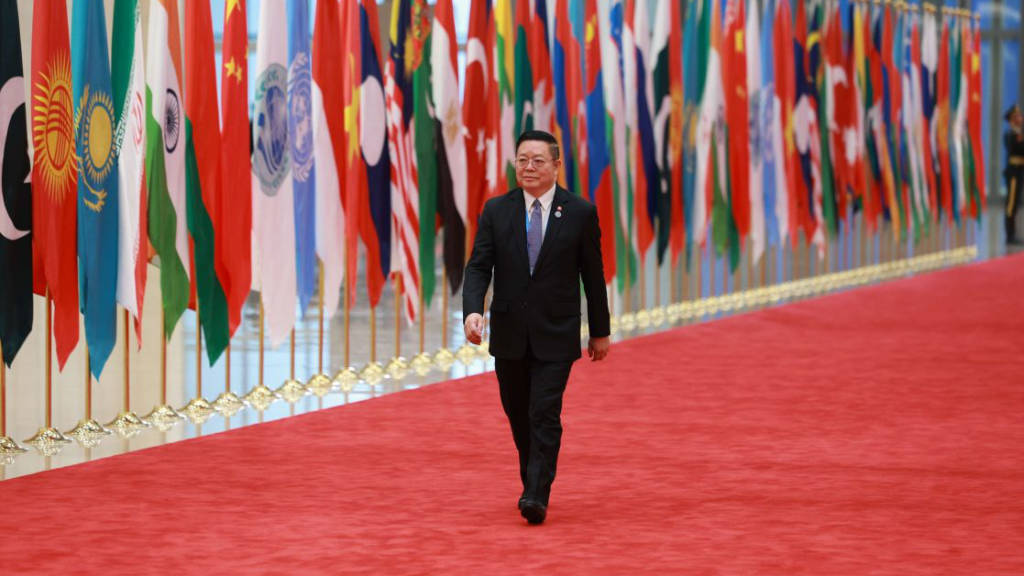Now the 2025 Heads of State summit of the Shanghai Cooperation Organisation have finished, attention turns to a related event – the meetings of the SCO +.
This is a huge bloc, as can be seen by the image of the ASEAN Secretary-General, Dr. Kao Kim Hourn, walking past participating country national flags at the conference. Who makes up the SCO+?
It includes the full members of the Shanghai Cooperation Organisation: Belarus, China, India, Iran, Kazakhstan, Kyrgyzstan, Pakistan, Russia, Tajikistan and Uzbekistan, together with the new SCO category of SCO Partners, which includes Armenia, Azerbaijan, Bahrain, Cambodia, Egypt, Kuwait, Laos, Maldives, Myanmar, Nepal, Qatar, Saudi Arabia, Sri Lanka, Turkiye, Turkmenistan, and the UAE.
Malaysia is also attending, as is Cuba, and the ASEAN Secretary-General, Dr, Kao. Apart from the ASEAN countries mentioned above, ASEAN also includes Brunei, Indonesia, Philippines, Singapore, Thailand and Vietnam. In addition to this, the UN Secretary-General, Antonio Gutteres is also in attendance along with representatives of the Asian Infrastructure Investment Bank and New Development Bank. North Korea’s Kim Jong-Un will join some of the group later during Beijing’s parade to acknowledge the end of World War II in Asia, an event that takes place on September 3rd. Kim’s Grandfather, Kim Il-Sung, fought the invading Japanese in that conflict. In total, this means that 35 nations (including North Korea) will have taken part in the SCO meeting in one or more formats.

A key part of the SCO discussions this year has been the need for reform of the United Nations. Numerous members of the SCO plus, including China, India and Russia, are deeply unhappy with the lack of reform at the UN at all levels. This includes the makeup of the UN security council’s five permanent members, in which China and Russia regularly brush up against the triumvirate of the United States, United Kingdom and France, who block any attempts to expand this to more than five nations lest they lose influence. It is a similar situation with UN finances, which are dominated at the World Bank and IMF level by the United States and European Union and whose lending and aid policies are increasingly seen as self-serving. It is of note that the SCO members have agreed to establish an SCO bank, although it remains to be seen where this will be headquartered – Kazakhstan or India are likely to be the primary options. What will probably occur though is a capitalisation of US$100 billion – the same size as the existing Asia Infrastructure Bank (AIIB) and the BRICS New Development Bank (NDB). We expect the SCO Bank to be committed to transport related infrastructure development.
On the UN issue however, it is pertinent to note that the President of Kazakhstan, Kassym-Jomart Tokayev, himself previously a Director-General of the United Nations in Geneva, issued warnings at the SCO, aimed at the United Nations, that should the UN not reform, this could permanently undermine confidence in the organization. Tokayev stated “In the current difficult geopolitical realities, we must support the UN as a universal and independent organization. At the same time, there is a need to reform the United Nations, primarily its key body, the Security Council. We are fully aware of the complexity of such a reform, but there is no other way. If the current generation of leaders refuses to fulfil this task, it can definitively and irrevocably undermine the confidence of states in the UN.”
Tokayev instead praised the Global Governance Initiative (GGI) put forward by Chinese President Xi Jinping, which contains a long-term vision for the development of the international community. That includes five principal commitments:
- Adherence to sovereign equality;
- An international rule of law;
- Multilateralism;
- A people-centered approach;
- A focus on taking real actions.
The challenge for the SCO + is to make this work. It already comprises an effective, participating 35 nations (the European Union has 27) while adding in the BRICS countries and partners states not part of the expanded SCO format (Brazil, Bolivia, Ethiopia, Nigeria, South Africa, and Uruguay) adds another 6 nations. In addition, Algeria, Bangladesh and Colombia are also equity holders in the NDB, while numerous other candidate nations wish to join.
Clearly, the SCO and SCO + has some significant muscle. One thing appears certain: the age of a unipolar global governance system based around the United States and Europe, with a few outliers is now over. The remaining question really revolves around what will succeed it – a reformed United Nations, or a bilateral global model with a diminished UN on one hand, and an SCO plus BRICS model on the other. Discovering which it will be is no longer a choice – this journey has already begun.
Note: Articles like this take many hours to prepare. Our analysis comes with decades of regional experience and professional expertise. When using our content, kindly refer to Russia’s Pivot To Asia as the source.
Enquiries? Email us at info@russiaspivottoasia.com
Further Reading
The Shanghai Cooperation Organisation: 2025 Demographics & Tianjin Summit Overview

 Русский
Русский













